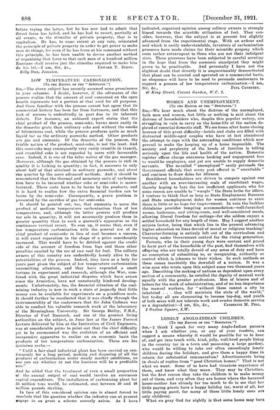WOMEN AND UNEMPLOYMENT.
ITo THE EDITOR OF THE " SPECTATOR."] SIR,—Wo hear much about the distress of the unemployed, both men and women, but little or nothing is said about the distress of householders who, despite this popular outcry, are struggling in vain to carry on the home-life of the nation de- pleted of essential domestic staff. We see home after home closing because of this great difficulty—hotels and clubs are filled with distracted middle-aged couples who have at last abandoned the attempt to cope with the astounding conditions which now prevail to make the keeping up of a home impossible. The anxiety and perplexity of the heads of families is telling seriously upon the life and health of the nation. Domestic register offices charge enormous booking and engagement fees to would-be employers, and yet are unable to supply domestic servants. The so-called " unemployed" easily persuade the Government officials that every post offered is " unsuitable " and continue to draw doles for idleness.
Bewildered householders are driven to compete against one another with an ever-increasing scale of exorbitant wages, thereby hoping to lure the few inefficient applicants who for some reason are unable to " wangle " the State bribe for idlers. I venture to think that so long as State Employment Bureaux and State unemployment doles for women continue to exist there is little or no hope for improvement. In vain the luckless chatelaine provides tempting accommodation—well-furnished rooms, bathroom, and sitting-room, and well-considered meals, allowing liberal freedom for outings—for she seldom enjoys a settled household for any length of time. May I suggest another serious factor, being that which lies in the present advancing higher education on lines devoid of moral or religious teaching?' Character-forming is entirely left out of the curriculum and training under Government control for the rising generation.
Parents, who in their young days were content and proud to form part of the households of the past, find themselves with offspring who are totally devoid of any sense of duty and have no conception of submitting to, or recognizing, authority or control which is irksome to their wishes. In such methods as these comes inevitably the downfall of a nation. It was a wise man who wrote upon this subject some two thousand years ago. Describing the making of nations as dependent upon every section of a community, he extolled the dignity of manual work equally with the greater professions. Men of leisure and of letters for the work of administration, and of no less importance the manual workers, for "without these cannot a city be inhabited . . . they will maintain the state of the world," but to-day all are clamouring to become top-dog, and youth of both sexes will not tolerate work and evades domestic service as a degradation !—I am, Sir, &c., CATHERINE M. PELT. 2 Onslow Square, S.W.


































 Previous page
Previous page